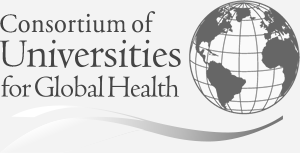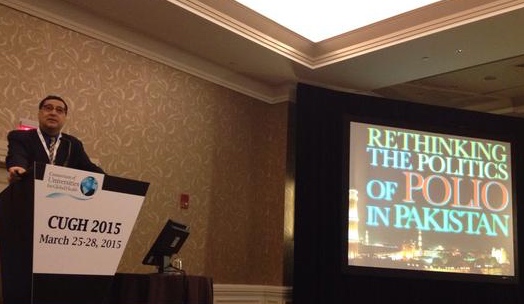Najam Speaks at CUGH on Politics of Polio
Dean Adil Najam of the Frederick S. Pardee School of Global Studies at Boston Univeristy was one of the featured speakers at a plenary panel at the 6th Annual Global Health Confernce organized by the Consortium of Univeristies for Global Health (CUGH), held in Boston, on March 26-28, 2015. The conference, organized this year by Boston Univeristy, focused on the theme of ‘Mobilizing Research for Global Health.’
 Prof. Najam spoke at a plenary panel on March 26, titled ‘Polio’s Last Mile: Navigating Violence, Insecurity and Acute Mistrust.’ The panel was premised around the idea that as the global polio eradication gets closer to success, the most formidable outstanding obstacles are often political and security-based: fragile or broken states, armed militant groups, and acute mistrust among diverse populations. The panel was included Dr. Stephen Morrison, Senior Vice President at the Center for Strategic and International Studies (CSIS); Dr. Heidi Larson, London School of Hygiene and Tropical Medicine and Dean Adil Najam.
Prof. Najam spoke at a plenary panel on March 26, titled ‘Polio’s Last Mile: Navigating Violence, Insecurity and Acute Mistrust.’ The panel was premised around the idea that as the global polio eradication gets closer to success, the most formidable outstanding obstacles are often political and security-based: fragile or broken states, armed militant groups, and acute mistrust among diverse populations. The panel was included Dr. Stephen Morrison, Senior Vice President at the Center for Strategic and International Studies (CSIS); Dr. Heidi Larson, London School of Hygiene and Tropical Medicine and Dean Adil Najam.
In his presentation Dean Adil Najam looked at the case of Pakistan and outlined the reasons that led to a sharp reversal in the polio erradication program, including the large scale targeting and killings of polio workers in the country. He pointed out that events of 2011 – including the setting up of a fake polio eradication program to assist in the capture and killing of Osama Bin Laden – have played a key role. Importantly, he argued, “this has given the Taliban and their supporters a scapegoat and reason to oppose and target polio workers.” He added that the any positive headway will require a serious reversal of the narratives in society, including those that now view internationally supported polio eradication programs as suspect, because of the way they were abused in 2011.
